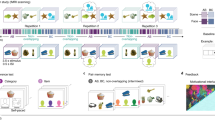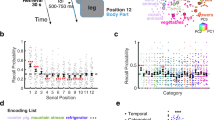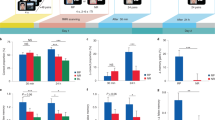Abstract
Regions of the brain's frontal lobe that are associated with memory retention and retrieval1,2 begin to mature during the last quarter of the first year in humans. This implies that infants younger than 8 or 9 months should have difficulty in registering an experience and retrieving it after a long delay3,4. Here we show that 13-month-old children are unable to recall a sequence of actions performed in front of them when they were 9 months old, whereas 21- and 28-month-olds are able to retrieve representations of the same acts when these were witnessed at 17 and 24 months. Our findings indicate that long-term retention increases during the second year and support the idea that maturation of the frontal lobe at the end of the first year contributes to memory enhancement during this period.
Similar content being viewed by others
Main
Infants of 6 months old can remember events for up to 24 hours5, which extends to up to a month when they are 9 months old6. It has been proposed that early deficiencies in registering and retaining memories for events in the long term might be related to the protracted maturation of the neocortex7. In humans, the brain undergoes important changes towards the end of the first year, including the growth and differentiation of cortical pyramidal neurons and of dendrites in the hippocampus8,9,10, which continue into the second year11,12. These developmental processes should increase the efficiency of integration and registration of information in the neocortex, and in the prefrontal cortex in particular1,2.
To test this hypothesis, we evaluated the ability of infants to retrieve representations after a delay of 4 months of motor acts first experienced at 9, 17 or 24 months of age. We used a deferred-imitation procedure in which the experimenter performed a sequence of actions with the aid of props while describing these actions verbally (for example, “Clean-up time!” was used for wiping the table with a paper towel and then throwing the towel into the waste basket; “Make a rattle!” was used for inserting a ring into a slot in a bottle and then shaking the bottle). We estimated the children's recall of these events four months later on the basis of the number of actions they successfully re-enacted and on the number of pairs of actions performed in the proper sequence.
We exposed infants at 9, 17 or 24 months of age (12 in each group) to three of five possible action-sequences and encouraged them immediately to imitate each sequence. Infants aged 17 and 24 months witnessed four demonstrations of each sequence; 9-month-olds witnessed an additional two demonstrations (for a total of six demonstrations per sequence) to compensate for their immaturity.
After a 4-month delay, we tested the children's ability to re-enact each sequence in response to the same verbal cues when presented with the props for all five action-sequences (the sequences were not demonstrated again after the delay). A comparison of the children's performance on the familiar and novel sequences served as a control for effects unrelated to memory. Five children from the first session were unable to participate in phase two, so their data were not included in the analysis. Six age-matched children, for whom all five action-sequences were novel in session two, were recruited to serve exclusively as controls.
As expected, the 21- and 28-month-olds showed a robust memory for events experienced 4 months earlier, whereas the 13-month-olds did not (Fig. 1). Subjects from the 21- and 28-month-old groups produced more target actions (F(1,183) = 9.95, P < 0.002) and more ordered pairs (F(1,183) = 24.55, P < 0.001) on familiar action-sequences than on novel ones. The 13-month-olds failed to produce a greater number of target actions (t =− 1.05, P < 0.15) or correctly ordered pairs (t =− 0.27, P < 0.39) on familiar sequences. In contrast, the 21-month-old (t = 3.00, P < 0.002) and 28-month-old (t = 3.17, P < 0.001) groups produced a significantly greater number of target actions on familiar sequences than on novel ones. This trend was even more pronounced for ordered pair scores, where 21-month-olds (t = 4.60, P < 0.001) and 28-month-olds (t = 3.55, P < 0.001) had consistently higher scores on sequences they had watched 4 months earlier.
The mean deferred-imitation scores (sum of target actions and ordered pairs reproduced) are shown according to age group for familiar (left bars) and novel (right bars) sequences. Older infants perform better than younger ones on sequences that are new to them, presumably because they are better able to deduce the appropriate target actions without the aid of memory. Note that the performance of the 13-month-old group is weak for both familiar and new action-sequences. The 21- and 28-month-old groups, however, perform significantly better on sequences that they have seen 4 months earlier than they do on novel sequences. Further experimental details are available from the authors.
Our findings that long-term memory in infants improves during their second year could be due to compromised registration or poor retrieval in the first year. In either case, our results support the popular belief that at 9 months the hippocampus and regions of the frontal cortex are not yet fully mature. They also indicate that there is a neurobiological component to memory enhancement across the second year, contrary to early assumptions that this is entirely attributable to experience13.
References
Buckner, R. L. et al. J. Neurosci. 15, 12–29 (1995).
Nyberg, L. et al. Proc. Natl Acad. Sci. USA 93, 11280–11285 (1996).
Herschkowitz, N., Kagan, J. & Zilles, K. Neuropediatrics 28, 296–306 (1997).
Herschkowitz, N., Kagan, J. & Zilles, K. Neuropediatrics 30, 221–230 (1999).
Barr, R., Dowden, A., & Hayne, H. Inf. Behav. Dev. 19, 159–170 (1996).
Carver, L. J. & Bauer, P. J. J. Exp. Psychol. 130, 726–745 (2001).
Bachevalier, J., Brickson, M. & Hagger, C. NeuroReport 4, 77–80 (1993).
Koenderink, M. J., Uylings, L. & Mrzljak, L. Brain Res. 653, 173–182 (1994).
Mrzljak, L., Uylings, H. B., Van Eden, C. G. & Judas, M. Prog. Brain Res. 85, 185–222 (1990).
Seress, L. & Mrzljak, L. Hippocampus 2, 127–141 (1992).
Huttenlocher, P. R. J. Comp. Neurol. 387, 167–178 (1997).
Van Buren, J. M. & Borke, R. C. Variations and Connections of the Human Thalamus (Springer, Berlin, 1972).
Piaget, J. The Origins of Intelligence in Children (transl. Cook, M.) (International Univ. Press, New York, 1952).
Author information
Authors and Affiliations
Corresponding author
Ethics declarations
Competing interests
The authors declare no competing financial interests.
Rights and permissions
About this article
Cite this article
Liston, C., Kagan, J. Memory enhancement in early childhood. Nature 419, 896 (2002). https://doi.org/10.1038/419896a
Issue Date:
DOI: https://doi.org/10.1038/419896a
Comments
By submitting a comment you agree to abide by our Terms and Community Guidelines. If you find something abusive or that does not comply with our terms or guidelines please flag it as inappropriate.




